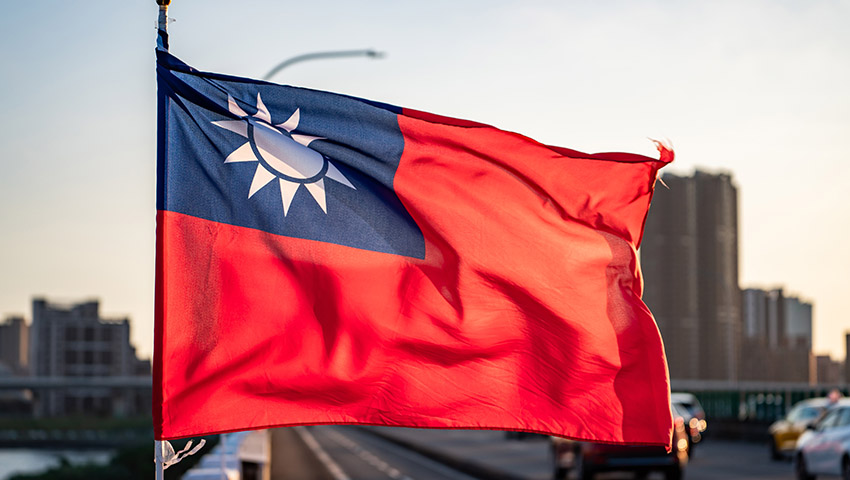President-elect Joe Biden’s response to the Trump administration’s defiance of the ‘One China’ policy is likely to provide insight into the former vice president’s attitudes towards Beijing.
To continue reading the rest of this article, please log in.
Create free account to get unlimited news articles and more!
In recent months, President Donald Trump has ramped up US support for Taiwanese independence, further souring relations with Beijing.
Earlier this month, the administration scrapped long-standing ‘contact guidelines’ limiting diplomatic relations with Taiwan.
Outgoing US Secretary of State Mike Pompeo said the “self-imposed” restrictions undermined US sovereignty, “appeasing” the Chinese communist regime to the detriment of an allied democracy.
“Taiwan is a vibrant democracy and reliable partner of the United States, and yet for several decades the State Department has created complex internal restrictions to regulate our diplomats, servicemembers, and other officials’ interactions with their Taiwanese counterparts,” Secretary Pompeo said.
“The United States government took these actions unilaterally, in an attempt to appease the Communist regime in Beijing. No more.”
He added, “The United States government maintains relationships with unofficial partners around the world, and Taiwan is no exception.
“Our two democracies share common values of individual freedom, the rule of law, and a respect for human dignity.”
Secretary Pompeo stressed that the US-Taiwan relationship “need not, and should not, be shackled” by restrictions introduced by a “permanent bureaucracy”.
This move followed the Defense Security Cooperation Agency’s (DSCA) approval of almost $2.7 billion in arms to Taiwan in late 2020.
The arms sales to Taiwan have included the provision of:
- 135 AGM-84H Standoff Land Attack Missile Expanded Response (SLAM-ER) Missiles;
- 11 High Mobility Artillery Rocket Systems (HIMARS);
- Six MS-110 Recce Pods;
- Four weapons-ready MQ-9B Remotely Piloted Aircraft;
- Two Fixed Ground Control Stations;
- Two Mobile Ground Control Stations;
- 14 Embedded Global Positioning System/Inertial Navigations Systems (EGI) with Selective Availability Anti-Spoofing Module (SAASM); and
- A Field Information Communications System (FICS).
US defence contractors felt the ire of the communist regime, which responded to the arms sales with sanctions on Lockheed Martin; Boeing Defense, Space & Security; and Raytheon Technologies.
China’s Foreign Ministry spokesman, Zhao Lijian, accused the US of “severely violating” the ‘One China’ policy and undermining China’s “sovereignty and security interests”.
“[We] urge the United States to strictly fulfil its commitment to the ‘One China principle’ and observe the three China-US joint communiqués, and stop selling weapons to Taiwan or having any military ties with it,” he said.
“We will continue taking necessary measures to safeguard national sovereignty and security interests.”
But with the Trump administration on its way out of the White House, it’s uncertain whether active support for Taipei’s autonomy would remain a feature of the US’ China strategy under President-elect Joe Biden's leadership.
Senior lecturer of the University of Tasmania, Mark Harrison, observes, “President-elect Joe Biden could publicly walk back the action to signal a change of China policy or discretely affirm it and sidestep Beijing’s ire by ascribing responsibility to Trump.”
According to Harrison, Biden risks escalating tensions if no steps are taken to rollback Trump’s policy toward Taiwan.
Harrison suggests that an extended period of defiance of the ‘One China’ policy may result in a forceful assertion of Beijing’s claim over Taiwan.
“Had the US government taken this action earlier, more clearly as part of its wide-ranging push-back against Beijing with months or years of escalation yet to run, it might have led to the most dangerous scenario of all — one in which Beijing concluded that it had run out of time on Taiwan and had to act,” he writes.
“This is an indictment of the approach to China by the Trump administration but also a reminder that no US presidency functions separately from the governance structure of the US system and the policy resets presented by its democratic elections.”
However, supporters of the Trump approach argue that perceived weakness from the Biden administration may also encourage President Xi Jinping to make a move on Taiwan.
Beijing’s recent heavy-handedness in Hong Kong could be an indicator of President Xi’s ambitions in Taiwan.
The incoming Biden administration would need to ensure its eagerness to stabilise US-China relations does not come at the expense of the freedoms of almost 24 million Taiwanese.
Get involved with the discussion and let us know your thoughts on Australia's future role and position in the Indo-Pacific region and what you would like to see from Australia's political leaders in terms of partisan and bipartisan agenda setting in the comments section below, or get in touch with
Charbel Kadib
News Editor – Defence and Security, Momentum Media
Prior to joining the defence and aerospace team in 2020, Charbel was news editor of The Adviser and Mortgage Business, where he covered developments in the banking and financial services sector for three years. Charbel has a keen interest in geopolitics and international relations, graduating from the University of Notre Dame with a double major in politics and journalism. Charbel has also completed internships with The Australian Department of Communications and the Arts and public relations agency Fifty Acres.

 Login
Login








